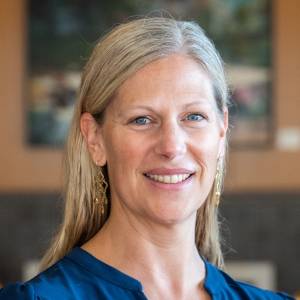Faculty & Staff Directory
The Education Faculty & Staff Directory allows you to search for specific faculty/staff in GVSU's Education Programs. Enter a keyword or name, or choose a Department or Program from the lists, and click the "Filter" button. See details for each person by selecting "View" next to their Department or Program(s).
For contacts in the College of Education and Community Innovation Dean's Office, please see the Dean's Office Staff directory.
Education Faculty & Staff Directory

- Professor
- Literacy, Educational Foundations, and Technology
- Literacy Studies
- Reading
As a literacy teacher educator, I connect my research with student learning and teacher education. As a former 8th-grade English Language Arts teacher in Illinois and a reading specialist/consultant in Arizona, I value teachers. I encourage my students/teachers to act as teaching professionals and to ignite a passion for literacy in their own students. Here at Grand Valley State University, I teach in our Literacy Studies program while serving as the program director.
- Literacy Studies
- General Education
Courses
- EDR 317: Class Consciousness: Popular Culture, Schooling, & Identity
- EDR 320: Language and Literacy: Development, Assessment, and Instruction
- EDR 321: Content Area Literacy
- EDR 621: Foundations in Literacy
- EDR 628: Literacy Instruction Across Disciplines (PK-6)
- EDR 630: Literacy Instruction Across Disciplines (7-12)
- EDR 625: Secondary Literacy: Learners, Text, and the Environment
- EDR 685: Literacy Instruction Practicum
- EDR 693: Master’s Project
Scholarly Interests
- Literacy and Reading
- Self-Study Research Methods
- Disciplinary Literacies & Interdisciplinary Instruction
- Teacher Education
- Critical Literacy (issues of power in education)
- Teacher Identity
- Literacy Tutoring
- New Literacies (intersection of technology and literacy)
- Ph.D., Arizona State University, 2007
- M.Ed., Arizona State University, 2003
- B.A., University of Michigan, 1998
Current research projects include:
- Interdisciplinary Instruction: I am currently co-authoring a professional education text focused on: (1) interdisciplinary instruction - a teaching approach that brings together separate disciplines around common themes, issues, and/or problems; (2) disciplinary literacies - the unique tools that experts in a given discipline use to engage in the work of that discipline; and (3) social justice - the work of redistributing power so that all people, regardless of their identities, have equitable access to resources and power. With these three foci in place, educators can enhance the cohesion and relevance of their teaching and student learning, while also supporting adolescents in their literacy development and sociocultural understandings.
- Critical Friendship (CF): I am one of the co-principle investigators on a research project that seeks to understand CF as a research method within self-study in deeper ways. Specifically, we seek to gain perspective on (1) affordances of CF, (2) uses of CF to ensure trustworthiness; (3) connections between CF and concepts such as credibility, fairness, dependability, reliability, assurance, and success; and (4) definitions and/or descriptions of quality CF. Through this research, we will explore the complexities of CF and offer steps forward for those using CF in their self-study research.
- Virtual Literacy Tutoring: I am one of the co-principle investigators on a research endeavor investigating the benefits tutors experience when participating in a virtual tutoring program to grow student reading. Since the COVID pandemic, educators have used virtual instruction more to meet the literacy needs of students. Working with the GV NextEd Co-Lab, we have seen positive growth for students engaged in meaningful one-on-one virtual literacy instruction, and seek to see how tutors benefit.
- Teacher Educator Activism: Working with colleagues from Sweden, this self-study explores the negative discourses around teacher education, how these discourses position teacher educators in specific ways, and how they influence teacher candidates within our courses. In that, we are investigating how we might use emotions stirred by positioning and liminality, and how activism might be a way of countering the discourses.
Recent Peer-Reviewed Publications
Stolle, E. P., & Frambaugh-Kritzer, C. (2022). Critical friendship as a research tool: Examining the critical friend definition continuum. In B. Butler & S. Bullock (Eds.) Learning through collaboration in self-study: Communities of practice, critical friendships, and collaborative self-study, Springer Publishing.
Frambaugh-Kritzer, C. & Stolle, E. P. (2020). Using autobiographical self-study methods to expand new ways of knowing collaborative writing. In C. Edge, A. Cameron-Standerford, & B. Bergh (Eds.), Textiles and Tapestries. EdTech Books. Retrieved from https://edtechbooks.org/textiles_tapestries_self_study/chapter_102
Frambaugh-Kritzer, C., & Stolle, E. P. (2019). Seeking pedagogical equilibrium while teaching synchronous online classes: A collaborative self-study. Action in Teacher Education, 41(4), 307-324, DOI: 10.1080/01626620.2019.1635922.
Stolle, E. P., Frambaugh-Kritzer, C., Freese, A., & Persson, A. (2019). Investigating critical friendship: Peeling back the layers. Studying Teacher Education, 15(1), 19-30.
Back